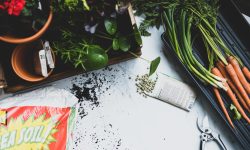Favourite Gluten-Free Items Available at Spud May National Celiac Awareness Month, but every day Spud…
Did you know that if we took better care of our soil, we could reduce greenhouse gas, use less pesticides, promote biodiversity, and support our local farmers?
But in order to do that, we need to change the way we think about soil. Agriculture is the greatest threat to biodiversity of any human activity, and we are making it worse by treating our soil like dirt.
Soil is precious. Due to its ability to store carbon, soil is the unsung organic hero that has the capacity to mitigate some of the effects of climate change. When soil is healthy, it absorbs carbon from the atmosphere, it requires less chemicals to produce healthy food, and it puts a halt on soil erosion. So at a time when climate change is threatening our food and ecological security, it is vital that we acknowledge that as the basis of plant growth, soil is essential to not only our survival, but the health of the planet. The need to preserve our soil is urgent now more than ever.
So why are we stubbornly clinging to a system that is degrading and poisoning our soil at an accelerated rate?
The short answer, is that after centuries of doing it this way, our food production industry has become accustomed to planting ‘annual’ grain crops as our main food sources. These grain crops of wheat, and corn account for 70% of human calories, and consequently take up a huge amount of farmland space across the globe. Annuals complete their entire life cycle within one growing season, meaning that by nature, they are harvested and replanted at such a rate that does not leave enough time for the nutrients in the soil to be restored. The annual crop system poses some considerable flaws, especially as we approach new circumstances through climate change, including:
- Annuals must be replanted each year from seed, which degrades the nutrients in the topsoil
- Annuals require large amount of pesticides and fertilizers, poisoning soil and surrounding wildlife
- Annuals poorly protect soil and water
- Annuals provide little habitat for wildlife
- The production of annuals emits significant greenhouse gas
So, what are our options? Well, one idea that’s got scientists and food activists buzzing is the idea of regenerative farming, and perennial crops. Regenerative farming is a strategy designed to build soil health or regenerate unhealthy soils (and does not involve GMO’s). One way to accomplish this, is to develop new, perennial versions of our major grain crops that could replace the annuals that are now in place. This would significantly reduce the environmental limitations of annual grain crops while restoring the soil’s health back to a place where it could mitigate the effects of climate change. When soil is healthy, it can store a huge amount of carbon (greenhouse gas).
The healthier the soil, the more carbon it is able to store. The development of perennial grains is gaining momentum in the scientific community, though it has a ways to go before being adopted into the mainstream. However, if our food production industry were able to make the transition, the revamped perennial crops would:
- Have longer growing seasons and more extensive roots systems, resulting in reduced water and nitrate losses (this is good!)
- Be tougher against weeds and more effective at capturing nutrients and water
- Require less pesticides and fertilizer (a win for everyone)
- Not require an annual replant, meaning the soil’s nutrients are preserved
- Allow more water to be filtered
- Allow more land to be available for habitat
Soil is the non-renewable resource that not enough people are talking about. It’s the basis of life, but we’ve been taking it for granted. The perennial grain could promote environmental conservation, food security, transform the sustainability of farming, and perhaps most fundamentally beneficial, it could save our soil. So where does that leave the rest of us?
The phrase, ‘don’t bite the hand that feeds you’ seems appropriate. We’re hard on our soil, and there are some scary consequences of running it into the ground. If we want to help, it starts with an inquiry, and sometimes a new perspective. Putting off your curiosity quiets the chatter required in propelling our society into creating change, so ask questions! If we want to change the world, we need fresh perspectives, and a fresh perspective on the importance of soil is a darn good start.





